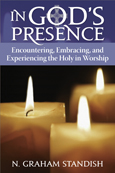
I am currently reading a book by N. Graham Standish, the pastor of Calvin Presbyterian Church in Zelienople, Pennsylvania, entitled In God's Presence. The book is subtitled Encountering, Experiencing, and Embracing the Holy in Worship. At this point I am only half way through this title, so blogging about it may be premature, however it has me thinking about the question, "How do we connect with God in worship?"
Standish discusses the difference between functional and spiritual worship. He defines functional worship as that which is "more concerned with worshiping in a right or accepted way than a transforming way." The author then identifies three ways in which worship can become merely functional, through intellectual, traditional, and programmatic emphasis which he defines as follows.
- Intellectual functionalism stresses human thinking over spiritual inspiration in preaching, praying, and practice. (Standish offers that this is a particular temptation of the Presbyterian or Reformed tradition.)
- Traditional functionalism values maintaining established practices in worship. (Sound familiar to anyone?)
- Programmatic functionalism focuses more on what attracts people to church, or what grabs, stimulates, or entertains them.
The truth is that every worship planner may have, at times, approached planning worship in each of these three ways. At times I have taken the easy way in planning a service the way we each know and understand. This is not necessarily bad, but can also be an expression of spiritual laziness. It is faster and easier than doing the hard work of discerning what may actually help people connect with the Divine. I further confess I have gone through periods where I was more concerned with "what works" to attract people to church rather than helping them form a deep connection with God when they got there. This approach is not so much wrong as it is incomplete.
In contrast to functional worship, Standish believes our task is to create what he calls "intentionally spiritual worship." Much of this has to do with the prayerful intention and discernment of the worship planner, worship leaders, or speaker. A lot of thought and prayer, and perhaps a lifetime of preparation goes into understanding and discerning people's needs and what really helps them connect with Divinity. This is not taking the easy way out, and certainly Standish would not support an approach that leads to mere emotionalism.
In my own experience, the most profound, break through moments of connection with the Divine have been unexpected, and not at my initiative. Let me offer one example. I recall many years ago presiding at a communion service with a migraine pounding in my temples, and all I wanted was for the service to be over so I could go home and bury my head under a pillow. In those moments I began to sense the unexpected promptings of what I have come to know as the Holy Spirit. Reluctantly and in some surprise, I turned over the Sunday bulletin and began to write down the thoughts that came unbidden. It seemed that divine Presence wanted to offer words of encouragement and guidance to the congregation concerning a particular situation of need and opportunity. It was a moment I have never forgotten, and despite my firm belief in careful, prayerful, thoughtful worship planning, an occurrence no worship planner could ever have anticipated.
So here is my question: What helps you connect with the Divine in worship? What leads you to more fully experience a connection with God? It need not be dramatic. Do symbols and rituals help: a cross on the mantle, flowers or candles, the communion emblems? Does music help you connect? If so, what kind of music? What about prayer, sermons, etc? Does the physical architecture around you make a difference, or preparation of the sanctuary? What helps you connect?
Will you click on the comments button and share your experience? You can do so anonymously if you wish, but your thoughts may help us all as we seek a healthy, deep and satisfying connection with God in worship.
Posted by Carman




No comments:
Post a Comment
Note: Only a member of this blog may post a comment.